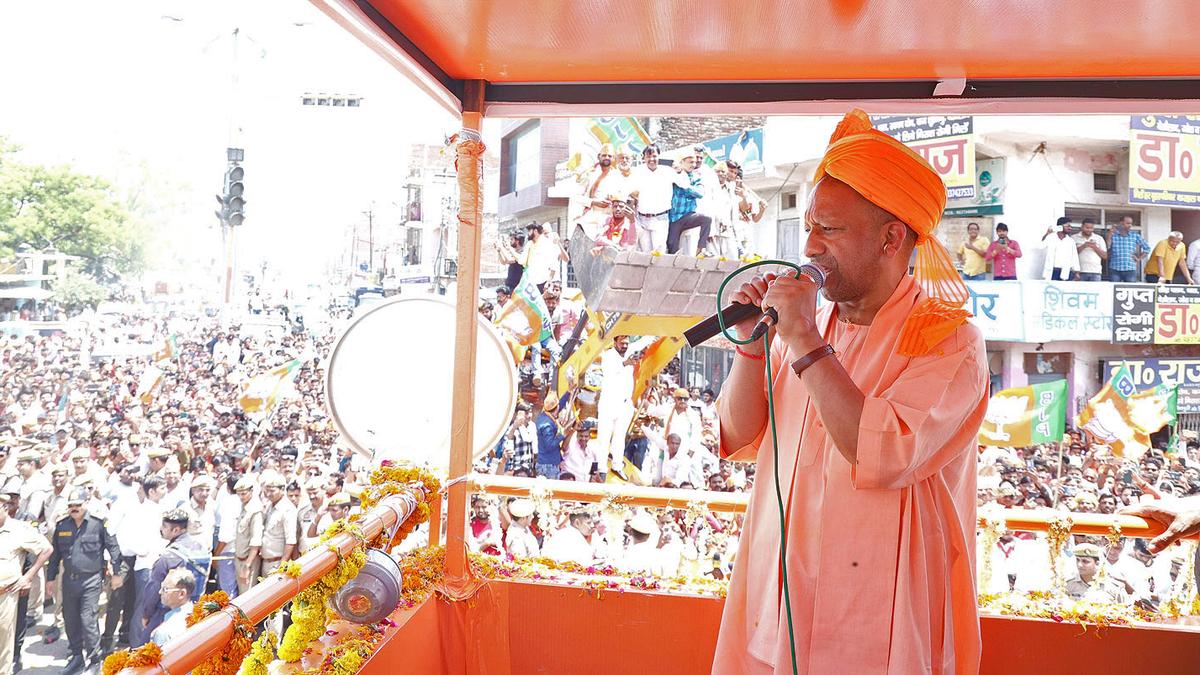
BJP locked in a direct contest with Samajwadi Party in third phase of election in Uttar Pradesh
The Hindu
With 10 out of the 80 Lok Sabha seats in Uttar Pradesh going to polls on May 7 in the third phase, election campaigning in India’s politically most crucial State reached a crescendo with all the political parties hitting top gear.
With 10 out of the 80 Lok Sabha seats in Uttar Pradesh going to polls on May 7 in the third phase, election campaigning in India’s politically most crucial State reached a crescendo with all the political parties hitting top gear.
Sambhal, Hathras, Agra, Fatehpur Sikri, Firozabad, Mainpuri, Etah, Badaun, Bareilly and Aonla vote on the back of a raucous campaign in which top leaders across political parties have rooted for their core and long-standing issues.
Prime Minister Narendra Modi, Union Home Minister Amit Shah and State Chief Minister Yogi Adityanath led the BJP’s charge against, what they called, dynasty and appeasement politics of the Congress and the Samajwadi Party (SP), and slammed the Opposition for declining the Ram Temple invitation. The SP, which has much at stake in phase three, pushed its caste census pitch and alleged that the BJP will end reservation and hence is seeking 400-plus seats in the Lok Sabha.
Of the 10 seats that will vote, the BJP had won eight — Hathras, Agra, Firozabad, Fatehpur Sikri, Etah, Badaun, Bareilly and Aonla — in 2019 with Mainpuri and Sambhal going to the SP.
In many of the seats in phase three, the BJP is locked in a direct fight against the SP-led INDIA bloc, with the Bahujan Samaj Party (BSP) aiming to make the contest three-cornered. In Sambhal, which has a sizeable Muslim electorate, the SP’s Zia Ur Rahman Barq is facing the BJP’s Parmeshwar Lal Saini. Sambhal has remained a tough electoral terrain for the BJP, with the party winning the seat only once. In Hathras, a Scheduled Caste-reserved constituency, the SP’s Jasveer Valmiki is taking on Anoop Pradhan of the BJP.
This phase will be a test for the SP’s first family as well, with Dimple Yadav, Akshay Yadav and Aditya Yadav contesting Mainpuri, Firozabad and Budaun respectively. In Mainpuri, an SP bastion that the party has never lost, sitting MP Ms. Yadav is taking on Jaiveer Singh of the BJP. In Firozabad, the BJP candidate Chandra Sen Jadon is contesting against Mr. Akshay.
The campaigning in these seats remained stormy with Mr. Shah questioning the SP president Akhilesh Yadav over dynasty politics and wondering whether the Opposition party had failed to find any ‘Yadav’ candidate from outside the family.

“Writing, in general, is a very solitary process,” says Yauvanika Chopra, Associate Director at The New India Foundation (NIF), which, earlier this year, announced the 12th edition of its NIF Book Fellowships for research and scholarship about Indian history after Independence. While authors, in general, are built for it, it can still get very lonely, says Chopra, pointing out that the fellowship’s community support is as valuable as the monetary benefits it offers. “There is a solid community of NIF fellows, trustees, language experts, jury members, all of whom are incredibly competent,” she says. “They really help make authors feel supported from manuscript to publication, so you never feel like you’re struggling through isolation.”

Several principals of government and private schools in Delhi on Tuesday said the Directorate of Education (DoE) circular from a day earlier, directing schools to conduct classes in ‘hybrid’ mode, had caused confusion regarding day-to-day operations as they did not know how many students would return to school from Wednesday and how would teachers instruct in two modes — online and in person — at once. The DoE circular on Monday had also stated that the option to “exercise online mode of education, wherever available, shall vest with the students and their guardians”. Several schoolteachers also expressed confusion regarding the DoE order. A government schoolteacher said he was unsure of how to cope with the resumption of physical classes, given that the order directing government offices to ensure that 50% of the employees work from home is still in place. On Monday, the Commission for Air Quality Management in the National Capital Region and Adjoining Areas (CAQM) had, on the orders of the Supreme Court, directed schools in Delhi-NCR to shift classes to the hybrid mode, following which the DoE had issued the circular. The court had urged the Centre’s pollution watchdog to consider restarting physical classes due to many students missing out on the mid-day meals and lacking the necessary means to attend classes online. The CAQM had, on November 20, asked schools in Delhi-NCR to shift to the online mode of teaching.









